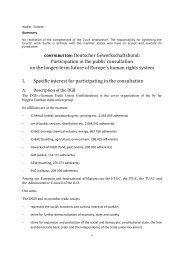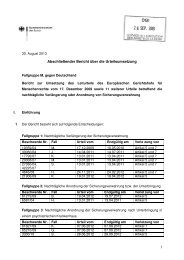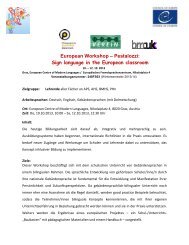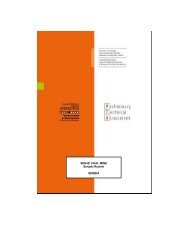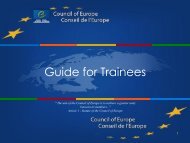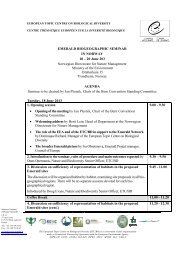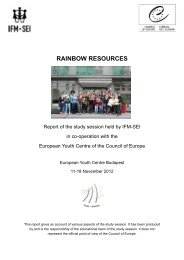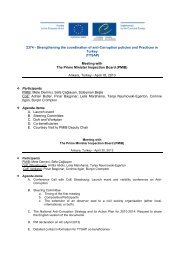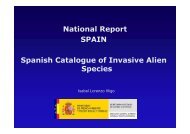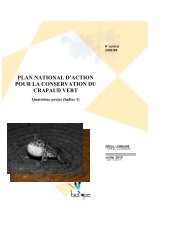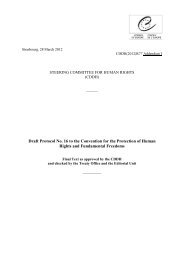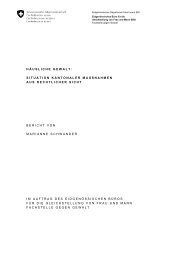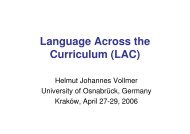Draft Declaration - Council of Europe
Draft Declaration - Council of Europe
Draft Declaration - Council of Europe
You also want an ePaper? Increase the reach of your titles
YUMPU automatically turns print PDFs into web optimized ePapers that Google loves.
22 September 2013 CDMSI(2013)007rev2<br />
<strong>Draft</strong> <strong>Declaration</strong> <strong>of</strong> the Committee <strong>of</strong> Ministers<br />
on the protection <strong>of</strong> journalism and safety <strong>of</strong> journalists and other media actors<br />
…<br />
(Adopted by the Committee <strong>of</strong> Ministers<br />
at the **the meeting <strong>of</strong> the Ministers' Deputies)<br />
1. Journalists and other media actors in <strong>Europe</strong> are increasingly being harassed,<br />
intimidated, deprived <strong>of</strong> their liberty, physically attacked and even killed because<br />
<strong>of</strong> their investigative work, opinion or reporting. These abuses and crimes are<br />
<strong>of</strong>ten met with insufficient efforts by relevant state authorities to bring the<br />
perpetrators to justice, which leads to a culture <strong>of</strong> impunity.<br />
2. This alarming situation is not exclusively limited to pr<strong>of</strong>essional journalists and<br />
other traditional media actors. As the United Nations Human Rights Committee in<br />
its General Comment No. 34 1 , and other intergovernmental bodies have<br />
recognised, the scope <strong>of</strong> media actors has enlarged as a result <strong>of</strong> new forms <strong>of</strong><br />
media in the digital age. 2 Those at risk also include others who contribute to<br />
shaping public debate and persons performing journalistic activity or public<br />
watchdog functions.<br />
3. The right to freedom <strong>of</strong> expression, to receive and impart information, ideas and<br />
opinions without interference is guaranteed by the <strong>Europe</strong>an Convention <strong>of</strong><br />
Human Rights (article 10) and constitutes one <strong>of</strong> the fundamental principles upon<br />
which a democratic society is based. The public watchdog functions <strong>of</strong> the media<br />
are crucial for upholding these rights and for the protection <strong>of</strong> all other human<br />
rights. Misuse <strong>of</strong> power, corruption, discrimination, criminal activity and human<br />
rights violations have come to light as a direct result <strong>of</strong> the work <strong>of</strong> investigative<br />
journalists and other media actors. Making the facts known to the public is<br />
essential for redressing such situations and holding to account those responsible.<br />
4. Journalists and others who perform public watchdog functions through the media<br />
are <strong>of</strong>ten in a vulnerable position vis-à-vis the public authorities or powerful<br />
interests groups because <strong>of</strong> their role in informing the public and provoking<br />
debate on issues <strong>of</strong> public interest. Obstacles created in order to hinder access to<br />
information <strong>of</strong> public interest may not only discourage journalists and other media<br />
actors from fulfilling their public watchdog role, 3 but may also have negative<br />
effects on their safety and security.<br />
5. Attacks against journalists and other media actors constitute particularly serious<br />
violations <strong>of</strong> human rights because they do not only target individuals but deprive<br />
others <strong>of</strong> their right to receive information, thus restricting public debate, which is<br />
at the heart <strong>of</strong> pluralist democracy.<br />
6. The <strong>Europe</strong>an Court <strong>of</strong> Human Rights has held that the role played by journalists<br />
in a democratic society confers upon them certain increased protections under<br />
Article 10 <strong>of</strong> the Convention. The exercise <strong>of</strong> media freedom, including in relation<br />
to matters <strong>of</strong> serious public concern, also involves duties and responsibilities. The<br />
safeguard afforded by Article 10 to journalists in relation to reporting on issues <strong>of</strong><br />
1 44. Journalism is a function shared by a wide range <strong>of</strong> actors, including pr<strong>of</strong>essional full-time reporters and<br />
analysts, as well as bloggers and others who engage in forms <strong>of</strong> self-publication in print, on the internet or<br />
elsewhere, and general State systems <strong>of</strong> registration or licensing <strong>of</strong> journalists are incompatible with paragraph 3.<br />
Limited accreditation schemes are permissible only where necessary to provide journalists with privileged access<br />
to certain places and/or events. Such schemes should be applied in a manner that is non-discriminatory and<br />
compatible with article 19 and other provisions <strong>of</strong> the Covenant, based on objective criteria and taking into<br />
account that journalism is a function shared by a wide range <strong>of</strong> actors.<br />
2 See CM/Rec (2011)7 on a new notion <strong>of</strong> media.<br />
3 See in this regard Társaság A Szabadságjogokért v. Hungary no. 37374/05, 14.04.2009, para 38.
general interest is subject to the proviso that they are acting in good faith in order<br />
to provide accurate and reliable information in accordance with the ethics <strong>of</strong><br />
journalism’. 4<br />
7. The <strong>Europe</strong>an Court <strong>of</strong> Human Rights has established that states are required to<br />
create a favourable environment for participation in public debate by all persons,<br />
enabling them to express their opinions and ideas without fear. 5 To do this,<br />
States must not only refrain from interference with the individual’s freedom <strong>of</strong><br />
expression, but are also under a positive obligation to protect their right to<br />
freedom <strong>of</strong> expression against the threat <strong>of</strong> attack, including from private<br />
individuals, by putting in place an effective system <strong>of</strong> protection.<br />
8. Eradicating impunity is a crucial obligation upon States, as a matter <strong>of</strong> justice for<br />
the victims, as a deterrent with respect to future human rights violations and in<br />
order to uphold the rule <strong>of</strong> law and public trust in the justice system. 6 All attacks<br />
on journalists and other media actors should be vigorously investigated in a<br />
timely fashion and the perpetrators prosecuted. The effective investigation <strong>of</strong><br />
such attacks requires that any possible link to journalistic activities is duly taken<br />
into account in a transparent manner.<br />
9. A favourable environment for public debate requires States to refrain from judicial<br />
intimidation by restricting the right <strong>of</strong> individuals to disclose information <strong>of</strong> public<br />
interest through arbitrary or disproportionate application <strong>of</strong> the law, in particular<br />
the criminal law provisions relating to defamation, national security or terrorism.<br />
The arbitrary use <strong>of</strong> laws creates a chilling effect on the exercise <strong>of</strong> the right to<br />
impart information and ideas, and leads to self-censorship. Furthermore, prompt<br />
and free access to information as the general rule and strong protection <strong>of</strong><br />
journalists’ sources are essential for the proper exercise <strong>of</strong> journalism, in<br />
particular in respect <strong>of</strong> investigative journalism. 7<br />
10. Surveillance <strong>of</strong> journalists and other media actors and tracking <strong>of</strong> their online<br />
activities can endanger the legitimate exercise <strong>of</strong> freedom <strong>of</strong> expression if carried<br />
out without the necessary safeguards and can even threaten the safety <strong>of</strong> the<br />
persons concerned. It can also undermine the protection <strong>of</strong> journalists’ sources.<br />
11. In view <strong>of</strong> the foregoing, the Committee <strong>of</strong> Ministers<br />
- alerts member states to the increasing number <strong>of</strong> reports <strong>of</strong> attacks on journalists<br />
and other media actors in several parts <strong>of</strong> <strong>Europe</strong>, including specific dangers<br />
female journalists are faced with. These constitute attacks on the right to freedom<br />
<strong>of</strong> expression, to hold opinions and to receive and impart information and ideas<br />
and to other fundamental rights provided for in the <strong>Europe</strong>an Convention on<br />
Human Rights;<br />
- commits itself to facilitating the development <strong>of</strong> internet-based platform drawing<br />
on information supplied by interested media freedom organisations to record and<br />
publicise possible infringements <strong>of</strong> the rights guaranteed by Article 10 <strong>of</strong> the<br />
<strong>Europe</strong>an Convention on Human Rights<br />
- urges member States to fulfil their positive obligations to protect journalists and<br />
other media actors from any form <strong>of</strong> attack and to end impunity in compliance<br />
with the <strong>Europe</strong>an Convention on Human Rights and the case-law <strong>of</strong> the<br />
4 E.g. Standard Verlagsgesellschaft mbH (No 2) v. Austria no. 37464/02, 22.2.2007, para. 38.<br />
5 Dink v. Turkey nos. 2668/07, 6102/08, 30079/08, 7072/09, 7124/09, 14.09.2010, para 137.<br />
6 See Guidelines <strong>of</strong> the Committee <strong>of</strong> Minister <strong>of</strong> the <strong>Council</strong> <strong>of</strong> <strong>Europe</strong> eradicating impunity for serious human<br />
rights violations adopted on 30 March 2011.<br />
7 E.G. <strong>Council</strong> <strong>of</strong> <strong>Europe</strong> Convention on Access to Official Documents (CM Recommendation no. R(2000) 7 on<br />
the right <strong>of</strong> journalists not to disclose their sources <strong>of</strong> information.
<strong>Europe</strong>an Court <strong>of</strong> Human Rights; and to review at least once every two years<br />
the conformity with these obligations on the part <strong>of</strong> member States;<br />
- encourages member States to contribute to the concerted international efforts to<br />
enhance the protection <strong>of</strong> journalists and other media actors, by ensuring that<br />
legal frameworks and law enforcement practices are fully in accord with<br />
international human rights standards. The implementation <strong>of</strong> the UN Plan <strong>of</strong><br />
Action on the Safety <strong>of</strong> Journalists and the Issue <strong>of</strong> Impunity is an urgent an vital<br />
necessity;<br />
- will intensify its standard setting and co-operation activities for the protection <strong>of</strong><br />
journalism and the safety <strong>of</strong> journalists and other media actors as a priority and<br />
contribute expertise to other international organisations with regard to the<br />
particular competence <strong>of</strong> the <strong>Council</strong> <strong>of</strong> <strong>Europe</strong>;<br />
- will consider further measures to ensure the protection <strong>of</strong> journalists from threats<br />
and acts <strong>of</strong> violence as well as measures to eradicate impunity; and alignment<br />
with the <strong>Europe</strong>an Convention on Human Rights <strong>of</strong> laws and practices<br />
concerning defamation, anti-terrorism and protection <strong>of</strong> journalists’ sources.



